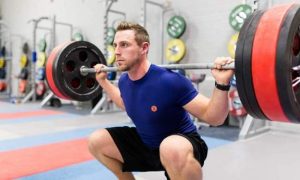
University of Salford academics are helping develop state of the art smart clothing enabling athletes to monitor their performance without the need for bulky gadgets.
Researchers from our sports science department in the School of Health Sciences have been awarded £165k from Innovate UK to work with Manchester-based company Smartlife, which specialises in smart garment technology – clothing that can measure signals such as heart rate, movement and muscle activity.
The company has created textile sensors and tiny electronics which can be integrated into sports clothing.
These discreet and comfortable sensors continuously record data which can be transmitted in real time to a Bluetooth receiving device such as a smart phone, providing feedback on how the athlete is performing during training sessions.
Researchers Dr Steve Preece and Dr Steve Atkins will now carry out work to develop the technology further by helping understand how to combine heart rate and acceleration data to build up an accurate picture of how an athlete’s body is using energy.
Eventually, the research can be used to improve the accuracy of the data which will let users of these garments know how much energy they are using in a training session or throughout the course of a day.
They will also carry out research to develop the capability of measuring electromyography (EMG) signals, which are produced when muscles contract.
Measuring EMG signals, especially during walking, running and cycling, can help an athlete or trainer understand muscle coordination and evaluate movement performance.
The researchers say as well as providing a benefit to elite athletes, the new technology will be able to help people who are only just starting to take part in activities to lead healthier lifestyles, by providing them with more information about what they are doing right or wrong.
It can also have potential uses for people suffering from some physical disabilities such as musculoskeletal problems as it will enable physiotherapists to assess the effectiveness of rehabilitation programmes and amend them if necessary.
The funded project is a knowledge transfer partnership (KTP) and aims to transfer knowledge about how to understand and interpret data from body worn sensors from the University of Salford into Smartlife.
Dr Steve Preece said: “This is an excellent example of how technology can be used to help people in their day to day lives. Our work will eventually lead to the development of a new product which will provide users with an accurate estimate of how much energy they have used over the course of a day and should help to change unhealthy sedentary behaviours, common in much of the population.
“If we can get EMG sensors incorporated into clothing, this will be a major breakthrough which will allow us to develop biofeedback systems to help both recreational and elite athletes improve performance and also assist with the physiotherapy rehabilitation of people suffering musculoskeletal disorders.”
Clare Simpson, spokeswoman for Smartlife, said: “The skills and knowledge transferred into the company as a result of the KTP will significantly expand the capabilities of Smartlife’s technology, helping us to achieve our vision to be the global market leader in body worn sensor technology across all relevant markets.”